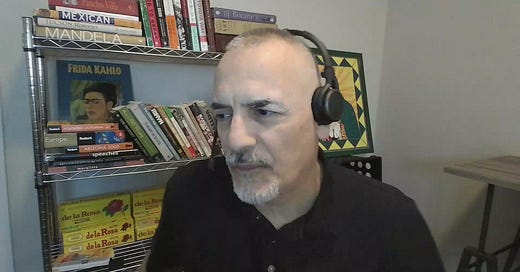These past few days, several people have reached out to me, alarmed at how quickly and blatantly Trump is implementing his hateful plan for working families across the nation. I have talked to a few experienced organizes. But most of the calls and messages have been from people who are brand new to organizing and activism.
The vibe hits along an entire spectrum; from pure panic to the calm realization that we need to all step up, regardless of experience.
I can’t remember a time when we had this amount of new interest from what we affectionally call “normies”, i.e. folks not typically involved directly in politics.
But I am not surprised.
Trump was not bluffing. We are all feeling the cold and sobering realization that this right-wing hell being unleashed on our most vulnerable communities is very real. For those of us that are experienced organizers, we know what to do. But it can get pretty overwhelming for people new to organized resistance.
How can you help? Where do you go? What do you do? How do you do it?
There is no way I, or any experienced community organizer, can answer all those questions with a single Substack post or podcast episode. Volunteers eventually need to be fully trained and that takes time.
But there are some basic principles/ dos and don’ts that I can offer to beginners ready to jump in now. By no means is this a comprehensive list and there are many seasoned community organizers out there that probably have other thoughts and principles to add or subtract form what I am offering here.
Nevertheless, here is what I have to offer:
Look for a local human rights organization to volunteer for.
There are plenty. This is the first step and the most efficient way to get started. Established organizations will have more experience are likely to be better organized. But don’t hesitate in considering new organizations so long as you fully vet them first.
Don’t be shy about saying no.
A bad fit may hurt the goals and mission of the organization you are volunteering for because most of these organizations run on limited budgets, time and resources.
Be prepared to do boring and “meaningless” tasks.
It is so important to eat a nice portion of humble pie when volunteering. You are not going to be placed in a leadership role. But know that your contribution - whether it is licking envelopes and stamps or organizing storage rooms, your embracement of these tasks provides more time for more seasoned organizers to do the higher-level work they are trained for. If you don’t get this, you are not ready to truly organize.
Stay out of the way and limit the political gossip.
Everyone has a story. You are going to want to bend the ear of the organizational leadership to tell yours. But think about it. If every new volunteer takes more than 5 minutes to talk about why they are volunteering, it can really add up. We need the leadership to lead and get to work. Your job is to help, not get in the way.
Respect meeting agendas and stay on point.
This is similar to the above point, but it is worth separating for emphasis. A meeting is not intended as an opportunity to share your opinions about the horrible president we have. A meeting is meant for planning, logistics and action. You have to stay disciplined and not dominate the dialogue, especially with irrelevant subject matter. We all know why you are there and if you truly want to build a better world and defend our vulnerable communities, you will stay on topic and resist irrelevant chatter.
Know your limitations but value your contributions.
It is very common for folks to feel like their limited time, talents and resources are not significant enough to make a difference. That is nonsense. In fact, if you come across an organization that implies that, walk away and find another group to volunteer for. A seasoned organizer knows that absolutely everyone can contribute something regardless of limitations on time, talents and resources. But it is also important to not overextend yourself. Be honest with the time you have and what you can contribute. This honesty will ultimately support the organization’s ability to fulfill its goals and objectives.
Social Media is a tool, not a social justice organization.
This is a big one for me. It is so easy to believe that your post is going to save the world. That, somehow, you are going to inspire people to embrace your politics or social justice stance with a simple post. Or that winning a debate on social media - if that is even possible - means you are doing your part. My God, no. Not even close. I am not saying that social media cannot be a helpful tool. What I am saying is that it can easily be confused with actual community organizing work. No amount of “likes” will stop ICE officers from raiding your local school. Again, I am not saying social media does not play a part in community organizing. I’m just saying that you have to be mindful of how you use it and be realistic about the role it plays in helping to get the work that is needed done on the streets and in our barrios.
It is important to demystify the work and not get overwhelmed. Trust yourself. You will figure it out. The worst thing you can do is to not get involved because you feel like this stuff is rocket science. It’s not.
Your instincts are right on: we need you and you know it is time to step up.









Share this post